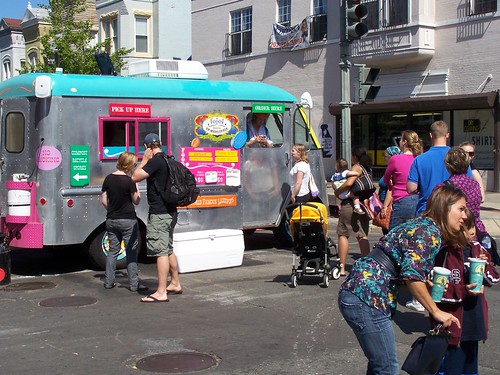Another scale of planning failure: neighborhood vs. city-wide interests and food trucks

Food truck at the H Street Festival, 2009.
In the discussion about the Uber taxi service ("Uber car service runs afoul of D.C. Taxi Commission," Washington Post) on the GGW blog ("Uber case is really about purpose of regulation") one of the points made about the Taxi Commission is the problem of "regulatory capture."
In economics, regulatory capture occurs when a state regulatory agency created to act in the public interest instead advances the commercial or special interests that dominate the industry or sector it is charged with regulating. Regulatory capture is a form of government failure, as it can act as an encouragement for large firms to produce negative externalities. The agencies are called "captured agencies".
While it happens that I don't think that's the issue when it comes to consideration and approval of innovative, or at least "new and different," services by the DC Taxi Commission (I think the issue is more indifference to "new and different" services, not a desire to protect taxicab drivers), the fact is that a form of regulatory capture occurs with regard to the new and different by neighborhood constituencies, be they business groups or residential interests.
I think that's what will doom the new plan by the city to give neighborhoods somewhat final authority for approving whether or not food trucks can operate in their particular geographies, as outlined in "D.C. to propose zones for food trucks" from the Post.
From the article:
Searching for a compromise in the bitter divide between brick-and-mortar restaurants and food trucks, the D.C. Department of Consumer and Regulatory Affairs on Friday will propose creating “vending development zones” that would allow neighborhoods to decide how many mobile and sidewalk vendors to allow in their area.
“It’s our way to really try to make the best use of public space among street vendors and farmers markets, food trucks and bricks-and-mortar businesses,” said Helder Gil, legislative affairs specialist for the department. “It tries to force everybody into the room . . . and find something that works for everybody.”
I have written about this issue quite a bit in terms of the tension between bricks and mortar businesses, business improvement districts and other commercial district revitalization groups, and managing a commercial district overall for vitality and excitement. See "Business improvement districts and boundary spanning " and "Food trucks as a way in."
For the most part, there is a form of "regulatory capture" with business improvement districts by the business proprietor members. The BIDs represent the businesses more than they manage overall the commercial district.
So while it can be advantageous for food trucks to be an element of the retail, services, and attraction mix in a commercial district (not everyone wants to eat in a sit down restaurant, some cuisines aren't available for sale in a commercial district, restaurants aren't proximate to parks and other spaces where people happen to be, people want to be outside, etc.), the likelihood of business improvement districts advocating for food trucks at the seeming cost of their business members is infinitesimal.
If the city's planners (business development and entrepreneurship, land use, tourism, etc.) argue that food trucks are an important element of the mix, how does that desire play out when the city devolves responsibility for accepting food truck operation to neighborhood interests?
In short, it won't get recognized and food truck approvals won't happen.
This new proposal is a mistake.
And note that this is an issue in other cities across the nation as well, because the tensions between brick and mortar businesses and so called itinerant businesses are universal.

Labels: commercial district revitalization planning, food-agriculture-markets, neighborhood planning, retail enterpreneurship development



0 Comments:
Post a Comment
<< Home